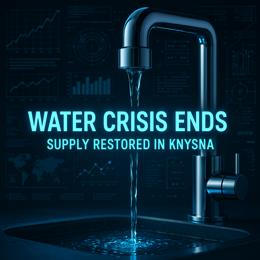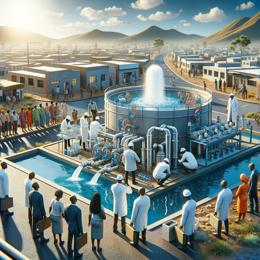Image created by AI
South Africa's Water Crisis: A Call for Systemic Change and Political Willpower
South Africa’s urban water management is at a precipice, with multiple metros, including Johannesburg, grappling with severe water crises – and it’s clear that technical fixes are insufficient to stem the tide. Johannesburg Mayor Kabelo Gwamanda's conversations with Daily Maverick spotlight these widespread service disruptions that persist despite attempts at resolution.
Rand Water's alarm about the potential collapse of its system has wide-reaching implications for Tshwane and Ekurhuleni as well. The broader national picture isn't any rosier, with Blue and Green Drop reports from the Department of Water and Sanitation (DWS) indicating declining quality and burgeoning losses within urban water infrastructures.
A growing number of South African towns, districts, and rural areas face unreliable basic services due to faltering infrastructure and governance systems. Even formal settings aren’t safe from water unpredictability, while informal facilities suffer even more. With an average of 47% of municipal water lost as "non-revenue water," and 64% of sewage and wastewater treatment plants at high risk of polluting natural water bodies, the service deficiencies threaten local economies and public health.
The current DWS leadership, spearheaded by Minister Senzo Mchunu and director-general Sean Phillips, contrast with their predecessors by focusing on addressing root causes rather than stopgap solutions. They suggest a water sector overhaul that could involve revisions of municipalities’ water and sanitation responsibilities, legislative changes, financial earmarking for infrastructure upgrade, and private sector participation in investment, maintenance, and service delivery.
Such reforms, however, present a political hot potato that requires adept maneuvering given the sensitive national debates and opposition to private sector involvement in water services.
Skilled labor is another facet of the problem, as revealed by data from the South African Institute of Civil Engineering (SAICE) showing a sizable exodus of engineers. The remaining gaps in local municipalities' technical knowledge base are formidable obstacles to service delivery and infrastructure upkeep.
Political dynamics at municipal levels further tangle the situation, with ideological divisions hampering pragmatism and cooperative strategizing. For private investors, such unstable environments are hardly enticing.
The water crisis underscores the growing municipal debt dilemma. Failing municipal payments to water boards hinder DWS ability to cover costs for raw water, also affecting transboundary water obligations. Moreover, the maladministered policy of free basic water supply compounds a system already stricken by revenue collection issues and public distrust in service payment.
Seeking a silver lining, Cape Town’s proactive measures post its own water crisis serve as a valuable, albeit non-universal, model.
For South Africa, drawing on diverse approaches hybridizing private-public collaboration, technology innovation, and context-sensitive interventions is critical. However, these must be underpinned by a substantive shift in political will and responsible governance to restore effectiveness in water services, transcending narrow partisan objectives that have led the sector, and the citizenry it serves, far astray.










